.
“One understands that the expression “Deep State” is a touch outré. But given the record since 2016, we surely must conclude that there is something behind our garish political spectacles that has a very great deal to say on matters that are supposed to rest with our electorate but don’t.”
June 1, 2021, ““The Rrrrussians come again.” “Pre-summit nonsense.” Patrick Lawrence, substack
“Joe Biden has just announced that he will convene with Vladimir Putin for the two leaders’ first summit, to be held 16 June in Geneva. It is not too difficult to put forward a forecast as to how this will turn out.
Our American president will read a laundry list of no-evidence allegations as to Russian misbehavior, threaten “consequences” if some faction of the national security state decides it would be useful to level more such allegations, sound the gong on human rights, and then conclude with proposals for bilateral cooperation on questions of mutual interest—soft stuff such as climate change and virus outbreaks. He will fly back to Washington on Air Force One having talked tough to the tough guy while doing his best to improve matters. That nothing will come of these efforts can hardly be assigned to Biden’s ostentatiously displayed sincerity as he made them.
Will that look good back home or what?
As to Putin, the Russian president surely understands by now that Biden’s claim to foreign policy expertise is sheer posture and that he is in the presence not of a statesman but of a logrolling pol whose primary concern is whether one or another pose will play in Peoria, as the Nixonians used to say. In deference to Biden’s age and—what to say here?—his fragile faculties, Putin will be courteous so as not to make a fool of his counterpart but altogether firm in his defense of Russian interests.
A little to my surprise, senior figures in the Russian firmament are now coming out with statements filled with hope and eager anticipation. Mikhail Gorbachev, 90 and still at it, said last week he thought Biden is a president “you can negotiate with.” FM Lavrov was properly guarded but net-optimistic. “We can expect–if efforts are made by both sides--that certain irritants will be removed,” he said when the summit was announced. I hope these two are right, but I have my doubts.
The above thoughts on Putin’s likely approach in Geneva are conjecture. My thoughts on Biden are more or less certain. This is so for one simple reason.
Last Thursday, Microsoft “and other private firms”—this from the New York Times report in Saturday’s editions—went public with an account (no mere allegations this time) that SVR, a Russian intelligence agency, had hacked the email system of the Agency for International Development, the infamous USAID. From The Times:
“Using that access, they sent authentic-looking messages to human-rights groups, nonprofit organizations, and think tanks, including some that have been critical of Mr. Putin. The emails contained links that gave the Russians access to the recipients’ computer networks.”
As if on cue, the Democratic leadership, on Capitol Hill and off, made rousing calls for “stronger action against Moscow” (The Times again). I was interested to note those prominent figures quoted in the Times piece. They were Adam Schiff, the Hollywood Democrat who runs the House Intelligence Committee, and Mark Warner, the Virginia Democrat of equal volubility in the Senate.
I love the finely managed orchestration here, and the–the what?–the neatness of the operation. Schiff and Warner have been reliable Russiagaters—and reliable liars, if you can bear the paradox—since the leak of Democratic Party mail in 2016 was transformed into a “Russian hack” on the basis of, we now know, nothing but lies of the sort Schiff and Warner trade in. SVR is the Russian agency upon whose head the U.S. has stacked piles of alleged cyberattacks. USAID has served, open and shut, as a CIA front off and on since Kennedy authorized its founding as a State Department subsidiary in 1961.
And then there is the question of provenance. The National Security Agency, which knows everything about everything, didn’t come up with the USAID discovery. Neither did the CIA. It was Microsoft “and other private firms” (never named). How come Microsoft broke the code-breakers’ code and not one of the [US taxpayer funded] national-security state’s intel tentacles? Hmmm.
The mind goes back to 2016, the mail leak that just had to be a hack. At the time, the professional liars in the intelligence apparatus, led by James Clapper (director of national intelligence) and John Brennan (CIA director) could muster only four of our 18 intelligence agencies to sign on for their January 2017 “assessment” of Russian culpability.The NSA gave that report a limp-wristed “low to moderate confidence” endorsement.
Some tentative conclusions. For the umpteenth time, we have a set of inflammatory allegations casting Russia in a malevolent role with no evidence to support them. It would appear that the “intelligence community”—that preposterous euphemism—didn’t want to touch this one, just as its various parts have maintained arm’s length in the past. And, the key to our understanding, there is the question of timing. Even The Times had the decency to note the Microsoft report arrives within three weeks of the Biden–Putin summit.
Readers who think I am suggesting a discernible pattern here have it exactly right.
Once the 2016 ruse concerning the mail leak-that-was-a-“hack” took hold, Donald Trump faced similar situations the whole of his four years in the White House. Every time he sought to put into place his policy of a neo-détente with the Russian Federation, some other awful allegation came up. Remember the Skripal farce? Late in Trump’s game, there was “Bountygate,” an exceptionally flimsy operation alleging that Moscow had offered money for American soldiers’ heads in Afghanistan—this just as Trump set his July 1 deadline for bringing said soldiers home.
More recently we have had the fraudulent case of Alexei Navalny, just in time to stir up arguments against German cooperation on the Nord Stream 2 pipeline. Thank goodness this and the Bountygate nonsense failed to achieve the objectives of those behind them. NS 2 is going through and the troops are coming home.
Since Biden took office, of course, we have had a steady stream of unsubstantiated charges that the Rrrrussians still lurk among us and are up to no good. Chief among these was the Solar Winds bit, in which Russian intel—SVR again—is said to have compromised no fewer than 18,000 government and corporate computer networks. We are told this occurred last year [2020] but was disclosed, curiously, shortly after Biden took office. One would have liked to have heard all about, in detail, just one case wherein the consequences of this, “one of the most sophisticated attacks ever seen” (The Times again), “a ‘worst nightmare’” (NPR), can be seen and understood. Nothing, of course. Eighteen thousand phantoms so far as one can make out.
Lately we have Russia tied to a ransomware attack on Colonial Pipeline’s vital hardware running up the East coast. This is assigned to a supposedly Russian operation supposedly called Dark Side, and of course yet again we have seen no evidence of this link. Dark Side: One must sit back and wonder about the fun they must have making up names out there in Langley. It is right up there with Fancy Bear and Cozy Bear, the “shadowy” (one of my favorite Times words, along with “murky”) forces behind the mail crisis five years’ back.
And now the USAID case.
‘But he tried.’
We have a pattern to think about, and we have the implications of this pattern.
So far as one can make out, nasty events pointing to Russian malfeasance reliably occur prior to those occasions decisions must be made as to the nature of U.S. policy toward Russia. This is especially so when there is even a hint that bilateral relations might stand even a minimal chance of improving.
While Bountygate and the Navalny silliness proved flops, on the broader question of U.S. policy toward Russia one must conclude this pattern has been effective. This implies something awful: We must ask whether better relations with the Russian Federation have effectively been rendered impossible. One understands that the expression “Deep State” is a touch outré. But given the record since 2016, we surely must conclude that there is something behind our garish political spectacles that has a very great deal to say on matters that are supposed to rest with our electorate but don’t.
A distinction, in conclusion. During Trump’s time, the pattern of events I describe was preventive: Trump’s policy on Russia was clear, admirably so, and had to be subverted. In Biden’s case, it seems to work in inverse fashion. Biden being a Russophobe from way back, he now needs merely justification to maintain tensions at the highest possible level while professing to do his damnest to repair our devastated ties.
Let us watch as Geneva approaches, and watch again as this potentially momentous summit in all likelihood turns out to be other than.”
|
|
.............


No comments:
Post a Comment